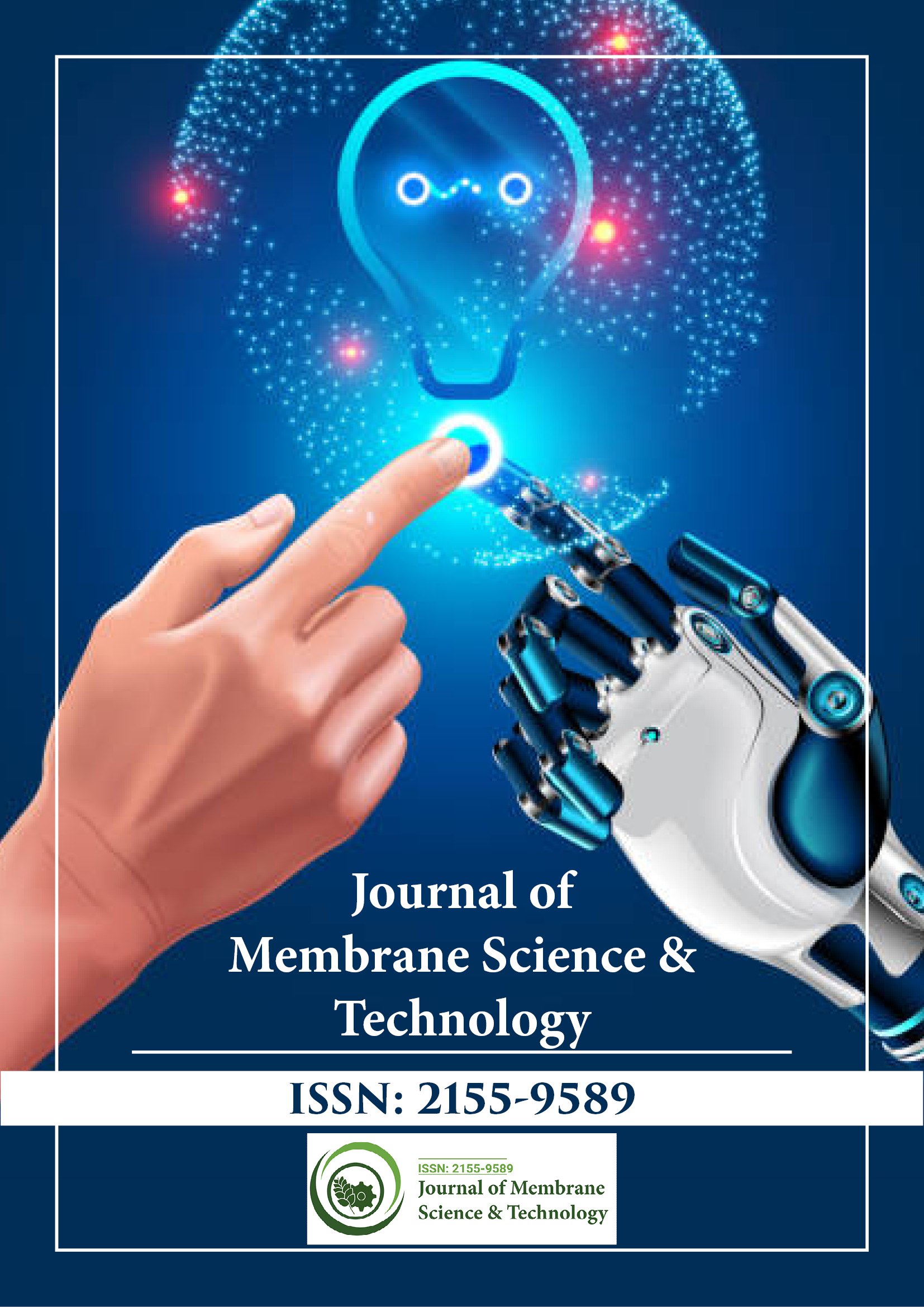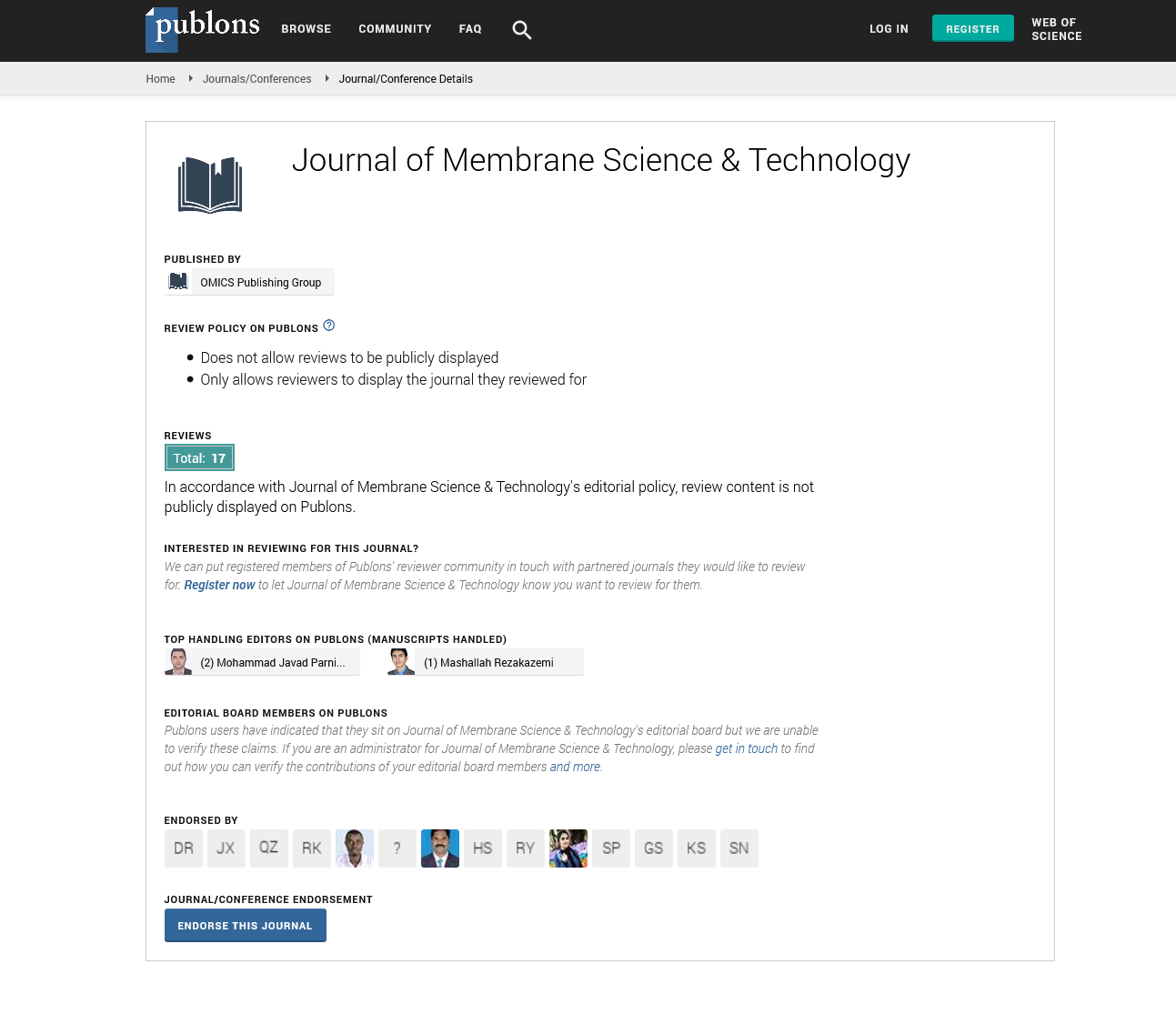Indexed In
- Open J Gate
- Genamics JournalSeek
- Ulrich's Periodicals Directory
- RefSeek
- Directory of Research Journal Indexing (DRJI)
- Hamdard University
- EBSCO A-Z
- OCLC- WorldCat
- Proquest Summons
- Scholarsteer
- Publons
- Geneva Foundation for Medical Education and Research
- Euro Pub
- Google Scholar
Useful Links
Share This Page
Journal Flyer

Open Access Journals
- Agri and Aquaculture
- Biochemistry
- Bioinformatics & Systems Biology
- Business & Management
- Chemistry
- Clinical Sciences
- Engineering
- Food & Nutrition
- General Science
- Genetics & Molecular Biology
- Immunology & Microbiology
- Medical Sciences
- Neuroscience & Psychology
- Nursing & Health Care
- Pharmaceutical Sciences
Articles published in Journal of Membrane Science & Technology have been cited by esteemed scholars and scientists all around the world. Journal of Membrane Science & Technology has got h-index 13, which means every article in Journal of Membrane Science & Technology has got 13 average citations.
Following are the list of articles that have cited the articles published in Journal of Membrane Science & Technology.
| 2024 | 2023 | 2022 | 2021 | 2020 | 2019 | 2018 | 2017 | 2016 | 2015 | 2014 | 2013 | 2012 | 2011 | |
|---|---|---|---|---|---|---|---|---|---|---|---|---|---|---|
Total published articles |
35 | 56 | 60 | 55 | 10 | 7 | 17 | 9 | 27 | 12 | 5 | 16 | 17 | 13 |
Research, Review articles and Editorials |
4 | 0 | 4 | 5 | 4 | 6 | 14 | 2 | 25 | 4 | 3 | 7 | 7 | 10 |
Research communications, Review communications, Editorial communications, Case reports and Commentary |
23 | 60 | 56 | 50 | 6 | 1 | 3 | 7 | 2 | 8 | 2 | 9 | 10 | 3 |
Conference proceedings |
0 | 0 | 0 | 0 | 0 | 0 | 34 | 44 | 0 | 0 | 0 | 0 | 0 | 0 |
Citations received as per Google Scholar, other indexing platforms and portals |
118 | 149 | 167 | 156 | 154 | 98 | 54 | 38 | 32 | 26 | 18 | 11 | 7 | 0 |
| Journal total citations count | 972 |
| Journal impact factor | 1.92 |
| Journal 5 years impact factor | 2.24 |
| Journal cite score | 5.4 |
| Journal h-index | 13 |
Important citations
Ahmed, S. F., Mofijur, M., Nuzhat, S., Chowdhury, A. T., Rafa, N., Uddin, M. A., ... & Show, P. L. (2021). Recent developments in physical, biological, chemical, and hybrid treatment techniques for removing emerging contaminants from wastewater. Journal of Hazardous Materials, 125912.
Alharbi, A., Shah, R. K., Sayqal, A., Subaihi, A., Alluhaybi, A. A., Algethami, F. K., ... & Youssef, H. M. (2021). Facile synthesis of novel zinc sulfide/chitosan composite for efficient photocatalytic degradation of acid brown 5G and acid black 2BNG dyes. Alexandria Engineering Journal, 60(2), 2167-2178.
Santra, B., Ramrakhiani, L., Kar, S., Ghosh, S., & Majumdar, S. (2020). Ceramic membrane-based ultrafiltration combined with adsorption by waste derived biochar for textile effluent treatment and management of spent biochar. Journal of Environmental Health Science and Engineering, 18(2), 973-992.
Alardhi, S. M., Albayati, T. M., & Alrubaye, J. M. (2020). A hybrid adsorption membrane process for removal of dye from synthetic and actual wastewater. Chemical Engineering and Processing-Process Intensification, 157, 108113.
Isik, Z., Arikan, E. B., Bouras, H. D., & Dizge, N. (2019). Bioactive ultrafiltration membrane manufactured from Aspergillus carbonarius M333 filamentous fungi for treatment of real textile wastewater. Bioresource Technology Reports, 5, 212-219.
Aziz, A., Ali, N., Khan, A., Bilal, M., Malik, S., Ali, N., & Khan, H. (2020). Chitosan?zinc sulfide nanoparticles, characterization and their photocatalytic degradation efficiency for azo dyes. International journal of biological macromolecules, 153, 502-512.
Douglas, T. A. (2018). Development of a Dielectrophoresis-Based Cancer-Cell Analysis Tool (Doctoral dissertation, Virginia Tech).
Garcia-Ramirez, R., Cerda-Kipper, A. S., Alvarez, D., Reveles-Huizar, S., Garza-Abdala, J. A., & Hosseini, S. (2021). Latest Updates on the Advancement of Polymer-Based Biomicroelectromechanical Systems for Animal Cell Studies. Advances in Polymer Technology, 2021.
Park, J., Komori, T., Uda, T., Miyajima, K., Fujii, T., & Kim, S. H. (2020). Sequential Cell-Processing System by Integrating Hydrodynamic Purification and Dielectrophoretic Trapping for Analyses of Suspended Cancer Cells. Micromachines, 11(1), 47.
Park, J. W., Lee, N. R., Cho, S. M., Jung, M. Y., Ihm, C., & Lee, D. S. (2015). Microdevice for separation of circulating tumor cells using embedded magnetophoresis with V?shaped Ni?Co nanowires and immuno?nanomagnetic beads. Etri Journal, 37(2), 233-240.
Kowalik, A., Kowalewska, M., & Gó?d?, S. (2017). Current approaches for avoiding the limitations of circulating tumor cells detection methods—implications for diagnosis and treatment of patients with solid tumors. Translational Research, 185, 58-84.
Makarasen A, Reukngam N, Khlaychan P, Chuysinuan P, Isobe M, Techasakul S. Mode of action and synergistic effect of valinomycin and cereulide with amphotericin B against Candida albicans and Cryptococcus albidus. Journal de mycologie medicale. 2018 Mar 1;28(1):112-21.
Marycz K, ?mieszek A, Jele? M, Chrz?stek K, Grzesiak J, Meissner J. The effect of the bioactive sphingolipids S1P and C1P on multipotent stromal cells–new opportunities in regenerative medicine. Cellular and Molecular Biology Letters. 2015 Sep 1;20(3):510-33.
Changmai, M., Mondal, P., Sinha, A., Biswas, P., Sarkar, S., & Purkait, M. K. (2020). Metal removal efficiency of novel LD-slag-incorporated ceramic membrane from steel plant wastewater. International Journal of Environmental Analytical Chemistry, 1-17.
Bouras, D., Mecif, A., Barille, R., Harabi, A., & Zaabat, M. (2020). Porosity properties of porous ceramic substrates added with zinc and magnesium material. Ceramics International, 46(13), 20838-20846.
Mohamed, M., Dayirou, N., Mohamed, H., André, N., Gisèle Laure, L. N., & Daniel, N. (2020). Effect of Porogenic Agent Type and Firing Temperatures on Properties of Low-Cost Microfiltration Membranes from Kaolin. Transactions of the Indian Ceramic Society, 79(1), 1-12.
Aissat, M., Hamouda, S., Bettahar, N., Tarboush, B. J., & Bahmani, A. (2019). Characterization and application of ceramic membranes prepared from Algerian kaolin. Cerâmica, 65, 554-561.
Usman, J., Hafiz, M., Othman, D., Ismail, A. F., Rahman, M. A., Jaafar, J., & Abdullahi, T. (2020). Comparative study of Malaysian and Nigerian kaolin-based ceramic hollow fiber membranes for filtration application. Malaysian J Anal Sci, 16(2), 78-82.
Rekik, S. B., Gassara, S., Bouaziz, J., Deratani, A., & Baklouti, S. (2019). Enhancing hydrophilicity and permeation flux of chitosan/kaolin composite membranes by using polyethylene glycol as porogen. Applied Clay Science, 168, 312-323.
Rekik, S. B., Bouaziz, J., Deratani, A., & Beklouti, S. (2017). Study of ceramic membrane from naturally occurring-kaolin clays for microfiltration applications. Periodica Polytechnica Chemical Engineering, 61(3), 206-215.

